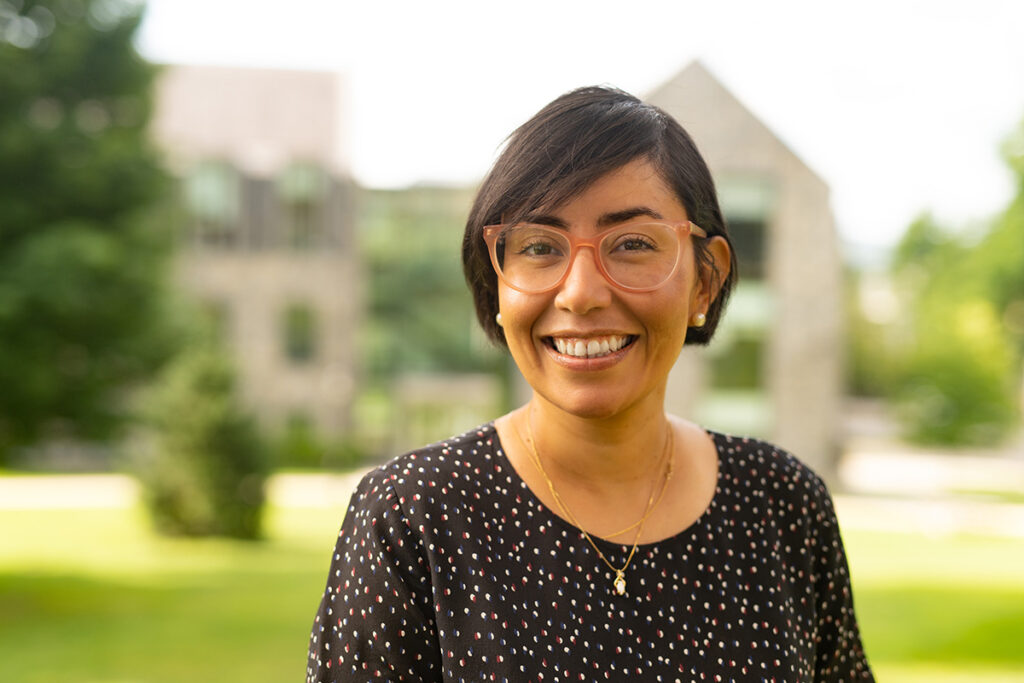Highlighting our faculty
- Faculty at Lafayette College are renowned leaders in their respective fields, exceptional teachers and dedicated mentors. Read more about our faculty.
Learn more about Mónica Salas Landa, associate professor of anthropology

Research area: I am a sociocultural anthropologist specializing in Latin America. My research focuses on political processes of state formation, nation building, and collective remembrance in post-revolutionary and contemporary Mexico. To explore these topics, I draw on a variety of sources such as oral narratives, historical documents, visual records, and material culture. My aim is to gain insight into the intricate dynamics of political change and cultural identity in Mexico.
My Lafayette journey: In 2016, I joined Lafayette College after completing a postdoctoral fellowship at the Mahindra Humanities Center at Harvard University. While the fellowship granted me the opportunity to devote my full attention to research, I soon realized how much I missed being in the classroom. Therefore, when I finished the fellowship, I was thrilled to embark on my teaching career at Lafayette. I knew that this institution would provide me with the opportunity to integrate my research with teaching and develop meaningful connections with my students.
What initially drew me to Lafayette, aside from the supportive and inclusive culture of the Anthropology and Sociology Department, was the chance to design innovative, challenging, and creative courses. The College actively encourages its faculty members to take risks and explore various forms of collaboration. For example, I have been able to incorporate Digital Humanities tools into my classes and regularly utilize materials from the Special Collections and College Archives. Additionally, I have collaborated with Skillman Library to bring exhibits like Hostile Terrain 94 to campus, as well as to invite renowned speakers such as Valeria Luiselli, the 2019 MacArthur Fellow. These experiences played integral roles in my courses.
An exciting collaboration on the horizon is the upcoming launch of the “Monument Project,” which is a part of Lafayette’s History Lab. This year, my colleague Andrea Smith and I are partnering to bring this project to life. Thanks to a Bergh Fellowship, we will be working with a group of students to develop digital walking tours that focus on local monuments and markers. The main objective of these tours is to critically examine the history of these monuments, the narratives they convey, and shed light on the untold stories they overlook. We are thrilled about this project and eagerly look forward to working with students next summer. If you are a current student who is interested in memory and heritage studies, please don’t hesitate to reach out, as we will be recruiting students this fall.
I believe that it is this collaborative dimension of teaching, coupled with the chance to work with exceptional students, that has been the most rewarding aspect of my time at Lafayette.
What I will be teaching in the fall: I am thrilled to announce the introduction of a new course this fall, made possible by the Lafayette Arts’ Art and Technology Grant: Museum Studies: A&S 374 History, Theory, and Debates. This course represents an exciting collaborative endeavor involving the Anthropology and Sociology Department, Skillman’s Special Collections and College Archives, and Digital Scholarship Services. By enrolling in this course, students will have the opportunity to delve into the social and cultural history of museums while exploring relevant theories that enhance our understanding of these contemporary institutions.
What sets this course apart and amplifies the excitement is the unique opportunity for students to actively engage in the development of a pop-up exhibit right here on campus. They will participate in crafting a compelling narrative around physical objects, writing exhibit text, developing virtual components, and being involved in the installation and deinstallation of the exhibit. Our exhibition, titled Potential History: Unlearning Imperialism, draws inspiration from Ariella Aïsha Azoulay’s groundbreaking book of the same name. Its purpose is to address the deeply entrenched violence inherent in museum collections through thought-provoking textual interventions. Be sure to stay tuned for updates on this exhibition!